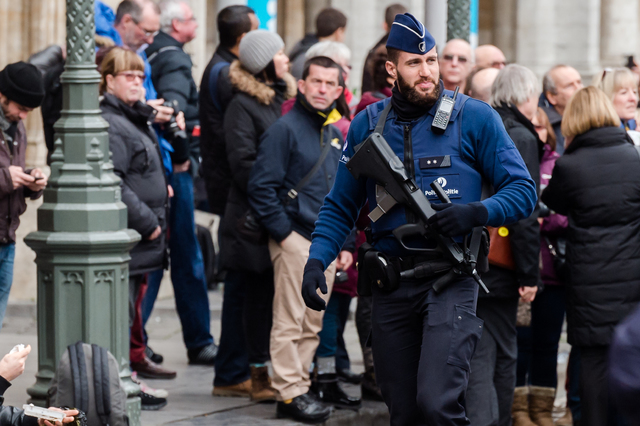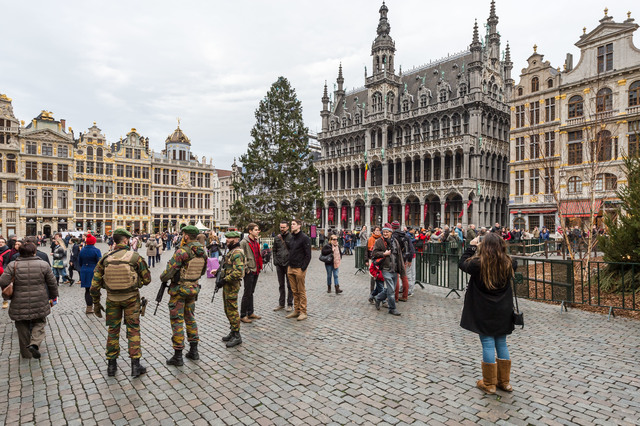BRUSSELS — Belgian authorities announced Tuesday they have arrested two men and seized military-type uniforms and Islamic State group propaganda in connection with a suspected plot to unleash holiday season attacks against police, soldiers and celebrated locations in Brussels. ADVERTISING
BRUSSELS — Belgian authorities announced Tuesday they have arrested two men and seized military-type uniforms and Islamic State group propaganda in connection with a suspected plot to unleash holiday season attacks against police, soldiers and celebrated locations in Brussels.
The attacks under preparation “were the same style as those perpetrated in Paris Nov. 13,” in which 130 people were killed and hundreds injured by suicide bombers and gunmen equipped with Kalashnikov-style assault rifles, according to an internal document from Belgian state security services cited by RTBF French-language television. Those lethal actions were claimed by the Islamic State extremist group.
The two suspects were arrested following searches Sunday and Monday in the Brussels area, the eastern Liege region and Flemish Brabant, the Belgian Federal Prosecutor’s Office said in a statement. It did not disclose their names or further information about them.
During the searches, no weapons or explosives were found, but military-type training uniforms, IS propaganda material and computer equipment were impounded and are being examined, the prosecutor’s office said.
It said the case was unrelated to the brazen and bloody extremist actions in Paris a month and a half ago but that the investigation, which is still ongoing, has revealed a “threat of serious attacks that would target several emblematic places in Brussels and be committed during the end-of-year holidays.”
The prosecutor’s office gave no more details about the intended targets, but an official close to the investigation told The Associated Press that they included the Belgian capital’s cobblestoned main square, thronged between Christmas and New Year’s with shoppers and strollers, as well as a police headquarters in an adjacent street.
“On the Grand Place, there are a lot of people, as well as soldiers and police who are patrolling, as well as a police station nearby,” said the official, who spoke on condition of anonymity because he was not authorized by the judge leading the investigation to make public statements.
As of Tuesday, police and soldiers in Brussels were ordered to take special precautions to ensure their own safety, Benoit Ramacker, spokesman for the Belgian government’s Crisis Center, said.
Police and army patrols were greatly beefed up in Brussels following the Paris attacks, and Ramacker said a new official threat assessment conducted Monday after the searches and arrests, concluded officers and troops deployed to protect Brussels have become targets of choice themselves.
“And so we prefer to remind them of certain safety guidelines, so that they reinforce their own security and all goes well,” Ramacker said in an interview at Crisis Center headquarters.
He and other government officials declined to provide specifics, but Belgian media reported that police officers in the six police zones of Brussels will no longer be allowed to leave their stations alone or without their firearm, and that police stations in most neighborhoods will shut their doors at 8 p.m. instead of remaining open around the clock.
In January, Belgian anti-terrorism units broke up what they said was an imminent attack on police by raiding a house in the eastern city of Verviers, killing two suspected jihadis and arresting a third. Their main quarry, however, was not there: Abdelhamid Abaaoud, who went on to become the suspected ringleader of the Nov. 13 attacks in Paris.
The prosecutor’s office said one of the suspects arrested this week was charged with acting as the leader and recruiter of a terrorist group planning to commit terrorist offenses, the other with participating in a terrorist group’s activities as a principal actor or co-actor. The official close to the investigation said both of the suspects arrested were male.
Four other people were taken in, questioned and then released, the prosecutor’s office said.
Numerous suspects in the Paris attacks, including presumed leader Abaaoud, suicide bombers Bilal Hadfi and Brahim Abdeslam, and the latter’s fugitive brother Salah Abdeslam, were Brussels residents or had Brussels ties. On Nov. 21, the terror alert level for the Belgian capital area was temporarily raised to its maximum level after authorities announced they had received credible information that a terrorist attack could be imminent.
Nine people suspected of links to the Paris attackers have also been taken into custody in Belgium, with the most recent arrest occurring Dec. 22. Belgium has also been one of the leading sources in Europe for foreigners recruited to fight for IS or other extremist Muslim groups.
On Wednesday, Brussels city leaders were expected to decide whether the annual New Year’s Eve fireworks display, scheduled for another large public square near the Grand Place, should go ahead as scheduled. Ramacker of the Crisis Center said heightened security measures are planned, but that at the moment, the Belgian government sees no reason to call for canceling the popular event, which draws a crowd of thousands.




